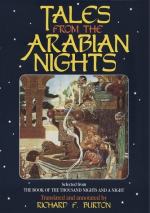things stood thus, he returned and the peacock said
to him, “What hath delayed thee, and thou the
nearest to me of all my servants and the dearest of
all my dependents?” replied the sparrow, “I
have seen a thing which is doubtful to me and whereat
I am affrighted.” Asked the peacock, “What
was it thou sawest?”; and the sparrow answered,
“I saw a man set up a net, hard by my nest,
peg down its pegs, strew grain in its midst and withdraw
afar off. And I sat watching what he would do
when behold, fate and fortune drave thither a crane
and his wife, which fell into the midst of the net
and began to cry out; whereupon the fowler rose up
and took them. This troubled me, and such is
the reason for my absence from thee, O King of the
Age, but never again will I abide in that nest for
fear of the net.” Rejoined the peacock,
“Depart not thy dwelling, for against fate and
lot forethought will avail the naught.”
And the sparrow obeyed his bidding and said, “I
will forthwith arm myself with patience and forbear
to depart in obedience to the King.” So
he ceased not taking care of himself, and carrying
food to his sovereign, who would eat what sufficed
him and after feeding drink his water and dismiss
the sparrow. Now one day as he was looking into
matters, lo and behold! he saw two sparrows fighting
on the ground and said in his mind, “How can
I, who am the King’s Wazir, look on and see
sparrows fighting in my neighbourhood? By Allah,
I must make peace between them!” So he flew
down to reconcile them; but the fowler cast the net
over the whole number and the sparrow happened to
be in their very midst. Then the fowler arose
and took him and gave him to his comrade, saying,
“Take care of him, " I never saw fatter or finer.”
But the sparrow said to himself, “I have fallen
into that which I feared and none but the peacock
inspired me with false confidence. It availed
me naught to beware of the stroke of fate and fortune,
since even he who taketh precaution may never flee
from destiny. And how well said the poet in
this poetry,
“Whatso is not
to be shall ne’er become; *
No wise! and that to
be must come to pass;
Yea it shall come to
pass at time ordained, *
And th’ Ignoramus[FN#173]
aye shall cry ‘Alas!’”
Whereupon quoth the King, “O Shahrazad, recount me other of these tales!”; and quoth she, “I will do so during the coming night, if life be granted to by the King whom Allah bring to honour!”—And Shahrazad perceived the dawn of day and ceased to say her permitted say.
When it was the One Hundred and Fifty-third Night,
She said:—I will relate the
Tale of Ali
bin Bakkar and of Shams
al-Nahar.




